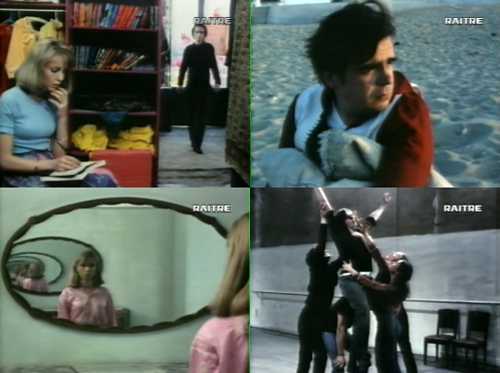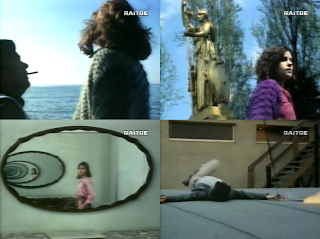This is the first of what will be at least an 8-part series about Jacques Rivette's legendary 12-hour serial Out 1, which thanks to an imported DVD from Germany I was recently able to see. The experience thoroughly baked my noodle and this is, in part, my attempt to come to terms with it.
"The 'unjustified' length of the films, then, represents an act of cultural transgression. The question, 'Why this length?,' should immediately provoke a reciprocal one: Why the standard length? Why should we automatically expect our movies to last between 90 minutes and two hours, feel cheated if they are less and demand particular justifications if they are more? Rivette not only demands our time, he demands our patience. We have to sit through long stretches of film in which nothing much (in terms of the conventional narrative expectations for which mainstream cinema has conditioned us, leading us point by logical point through the traditional process of order--disturbance-restoration/replacement) seems to be happening, or much the same thing seems to go on happening or to happen again. Yet few people who have sat through Rivette's films from beginning to end wish them any shorter. (Some reject them altogether, but even they seem not to question that the length is somehow part of the point, an essential component of the films' 'signifying practice,' their function within culture.) It is the very fact that the length is unnecessary that renders it indispensable. The apparent longueurs (the films seem shorter every time one re-sees them) are the most effective means of forcing us to question the experiences mainstream cinema offers us, the positions in which it places us. As with the question, 'Why this length?,' the question 'Why are we being asked to watch this?' raises a reciprocal one: Why are we 'normally' asked to watch the particular patterns that 'this' transgresses? Further questions immediately follow: What makes a narrative 'interesting'? Are we conditioned to apply only very limited criteria of 'interestingness'? Can we learn to be interested by other narrative procedures? The issues are radical, and as political as you want to make them."--Robin Wood
"Of course, length changes everything. And the reactions were more emphatic, subjective, and individual than for a film of normal length. Some people left before it was over, some arrived after the beginning; and among those who followed it from beginning to end, there were some who wanted to see it as a test of endurance, others because they gradually got interested. But in any case, it was impossible to judge. After you've gotten over the hump of the first four hours, you mainly feel inclined to stay and see it through. But that's a facile solution, because all of one's criteria for what is good or bad disappear, and one is experiencing purely the dure. There are some sequences which I think are failures, but after a certain number of hours, the whole idea of success and failure ceases to have any significance."--Jacques Rivette
dure:
a. 1. Hard; harsh; severe; rough; toilsome
The winter is severe, and life is dure and rude.
- W. H. Russell
v.i. 1. To last; to continue; to endure.
Yet hath he not root in himself, but dureth for a while.
- Matt. xiii. 21.
--The Free Dictionary
"What a crazy film! It lasts 12(!)urs and you don't understand who these people are and what are they doing!The main plot is about a bunch of clueless actors trying to bring on scene 'Prometheus' ,but there are lots of sub-plots,like the disappearing of Thomas and a crazy guy looking for Monsieur Warok....what's the meaning of all this???"--IMDB user "XopenairX," who gives Out 1 a 9 out of 10


No comments:
Post a Comment